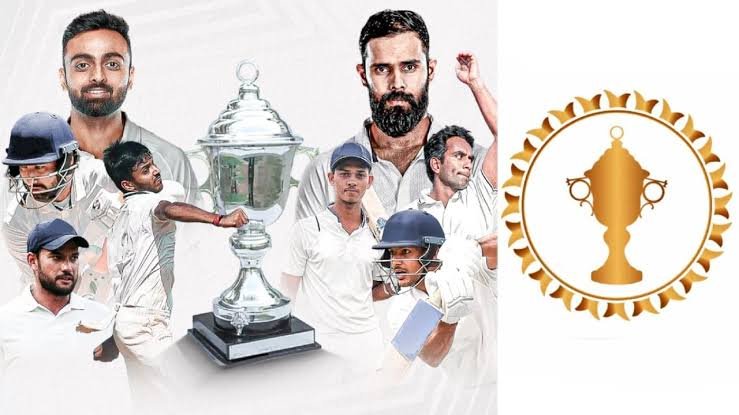An Introduction to the Topic
For a very long time, the history of Mumbai’s cricketing has been connected with domination in the Indian domestic cricket scene. After an absence of 27 years, the squad, which is frequently called to as the “cricketing powerhouse” of the nation, once again proved its status by claiming victory in the highly sought Irani Cup. During the match against Rest of India (RoI), Mumbai’s senior captain Ajinkya Rahane led his team to victory. The victory was achieved by virtue of a first-innings lead, which is a crucial factor in long-format domestic events like as the Irani Cup.
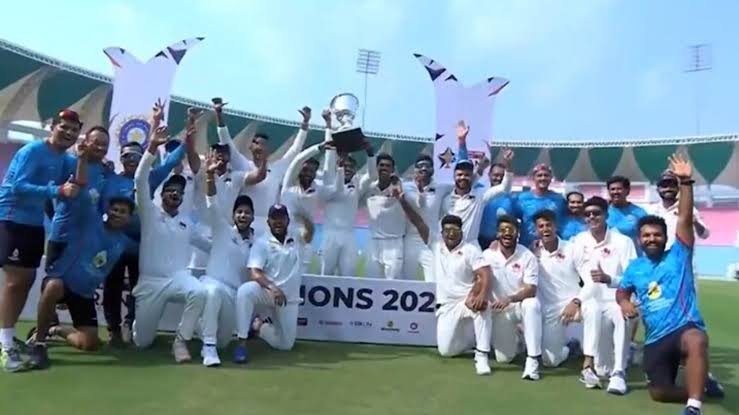
The match for the Irani Cup was played at the Bharat Ratna Shree Atal Bihari Vajpayee Ekana Cricket Stadium in Lucknow. It was an exciting clash between Mumbai, the team that is currently the champion of the Ranji Trophy, and Rest of India, a squad that featured outstanding performances from other state teams. Mumbai’s dominant first-innings lead of 121 runs, built on excellent individual and team performances, ensured that the prestigious Irani Cup would be returned to the city after nearly three decades. Though the match ended in a draw, Mumbai’s commanding advantage in the Irani Cup was a testament to their impressive display throughout the contest.
This article digs deep into the enthralling encounter, covering crucial events, individual performances, tactical decisions, and the significance of this monumental victory for Mumbai and Indian domestic cricket, particularly in the Irani Cup.
One of the most prestigious domestic competitions, the Irani Cup has a rich history in Indian cricket. The Irani Cup was established to honor Zal Irani, a prominent figure in Indian cricket, and has since become a symbol of domestic cricketing supremacy. The Irani Cup is contested between the Ranji Trophy champions and a Rest of India team, which consists of top-performing players from other state teams. Traditionally, the Irani Cup serves as the opening match of the domestic cricket season, providing both seasoned players and emerging talents a platform to showcase their skills.
For Mumbai, a team with an unparalleled record of 41 Ranji Trophy titles, the Irani Cup holds great significance. Despite their dominance in domestic cricket, Mumbai had not captured the Irani Cup since 1996. This 27-year drought made the 2024 edition of the Irani Cup especially crucial for the squad, as they sought to reassert their influence and break the long wait for this coveted trophy. Winning the Irani Cup in 2024 not only cemented their dominance in the Ranji Trophy but also served as a reminder of Mumbai’s rich cricketing heritage.
Mumbai’s journey to reclaim the Irani Cup was marked by tactical brilliance, stellar individual performances, and a deep sense of purpose. The team was led by veteran Ajinkya Rahane, whose leadership proved to be a vital factor in the match. With a balanced mix of experienced players and young talents, Mumbai approached the Irani Cup with determination, eager to lift the trophy once again.
As the match progressed, Mumbai’s first-innings total of 537 became the foundation for their stronghold in the Irani Cup contest. Key contributions from players like Tanush Kotian and Mohit Avasthi ensured that Mumbai not only crossed the 500-run mark but also secured the crucial first-innings lead, a defining moment in the Irani Cup final. Kotian’s brilliant century and Avasthi’s steadfast half-century built a formidable partnership that shattered records and gave Mumbai a solid edge in the Irani Cup showdown.
The Irani Cup final highlighted Mumbai’s resilience and ability to perform under pressure. Even when Rest of India mounted a strong comeback, Mumbai’s bowlers and fielders kept their composure, ensuring they maintained control of the match. The partnership between Kotian and Avasthi in the lower order, which produced 158 runs, became the highest ninth-wicket partnership in the history of the Irani Cup. This historic achievement not only demoralized the Rest of India team but also underlined Mumbai’s determination to seize the Irani Cup after such a long wait.
For Mumbai, the Irani Cup was not just another trophy; it represented a return to glory and a reaffirmation of their position as the dominant force in Indian domestic cricket. Players like Ajinkya Rahane, who had been a part of several high-profile international fixtures, brought invaluable experience to the table. His leadership, combined with the efforts of both veteran and young players, was instrumental in securing the Irani Cup for Mumbai.
The Rest of India team, on the other hand, fought valiantly but was ultimately outclassed by Mumbai’s strategic execution. While RoI had their moments of brilliance, including notable performances by Yashasvi Jaiswal and Saransh Jain, they couldn’t recover from the first-innings deficit. The Irani Cup match served as a learning experience for the Rest of India squad, showcasing the importance of capitalizing on key moments in such a prestigious competition.
Mumbai’s triumph in the Irani Cup is a moment of pride not just for the team but for the city’s cricketing community as a whole. The Irani Cup has long been considered a litmus test for teams and players, as it pits the best against the best in Indian domestic cricket. For Mumbai, winning the Irani Cup after 27 years has reinvigorated their status as the most successful team in the competition’s history, further solidifying their legacy in Indian cricket.
As Mumbai lifted the Irani Cup, celebrations erupted across the city, with fans rejoicing in the team’s long-awaited victory. The 2024 edition of the Irani Cup will go down in history as one of the most memorable tournaments, where Mumbai finally broke their 27-year drought and reclaimed the prestigious trophy.
The Irani Cup holds a special place in Indian cricket, and Mumbai’s victory in 2024 added yet another chapter to the tournament’s illustrious history. This win also serves as a reminder of the importance of domestic cricket in India and how it continues to produce world-class talent. With players like Tanush Kotian, Mohit Avasthi, and Ajinkya Rahane leading the charge, Mumbai’s success in the Irani Cup is a reflection of the team’s deep-rooted cricketing culture and their unwavering commitment to excellence.
As we look ahead, Mumbai’s success in the Irani Cup could signal the beginning of another era of dominance in Indian domestic cricket. For now, though, the team and its fans can bask in the glory of their hard-earned victory, knowing that they have etched their names into the annals of the Irani Cup’s rich and storied history.
First Innings: Mumbai’s Batting Prowess Sets the Tone
Mumbai’s road to victory was prepared during the first innings, where they posted a gigantic total of 537 runs. This intimidating score put them in a dominating position and established the tone for the rest of the encounter. The innings witnessed several significant contributions from Mumbai’s batsmen, notably from the top order, who built a solid platform for the squad.
At the top of the order, Prithvi Shaw played a characteristically aggressive knock, scoring 76 runs. Shaw’s approach to batting was representative of his attacking philosophy, as he punished the RoI bowlers with boundaries and rapid runs between the wickets. His century provided Mumbai with the early impetus they needed, and his departure was a sigh of relief for the RoI bowlers.
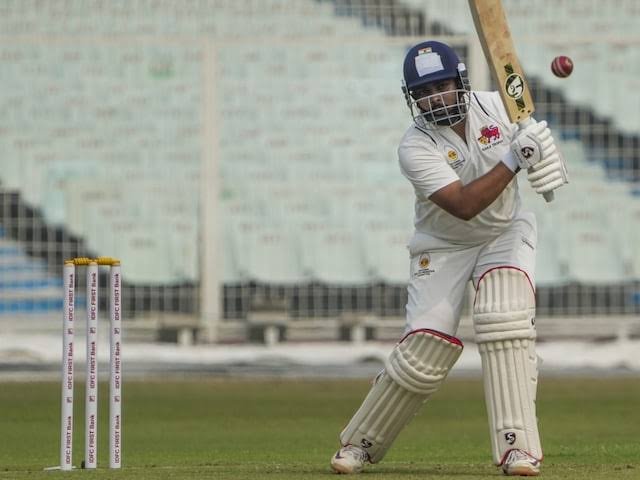
Following Shaw’s exit, the middle order contributed considerably, with veteran players like Ajinkya Rahane and Shardul Thakur chipping in with key runs. Rahane’s calm and collected knock of 9 runs may not seem great on the scoreboard, but his role as the anchor was important in ensuring that Mumbai did not lose momentum after Shaw’s exit in the Irani Cup. Thakur, a skilled all-rounder, gave depth to the batting lineup, albeit his innings were brief, yet crucial in the Irani Cup match.
However, it was Mumbai’s lower order who made the most dramatic impact on the Irani Cup game. Tanush Kotian, Mumbai’s all-rounder, struck a brilliant century (114 not out), his second in First-Class cricket, and it came at the perfect time during the Irani Cup final. Kotian’s innings were a masterclass in patience, persistence, and clever shot selection. He took advantage of wayward deliveries and capitalized on the gaps in the field, all while safeguarding his wicket in vital periods of the Irani Cup clash. His ability to rotate the strike and attack RoI’s bowlers made him the standout player of the first innings.
Mohit Avasthi, Mumbai’s trusty tailender, offered important support to Kotian. His hit of 51* was important in expanding Mumbai’s total above 500 in the Irani Cup. Avasthi’s calm approach matched Kotian’s aggression, and the combination formed a record-breaking ninth-wicket partnership of 158 runs—the greatest in the history of the Irani Cup. This partnership not only tormented RoI’s bowlers but also discouraged their fielders, as Mumbai piled on the runs, cementing their dominance in this edition of the Irani Cup.
Rest of India’s Response: Jaiswal’s Brilliance and Mumbai’s Bowling Strategy
After Mumbai’s massive first-innings score of 537, the emphasis was on Rest of India to reply with a large score of their own. RoI’s batting lineup contained some of the greatest talents in Indian domestic cricket, and they needed to rise to the occasion to match Mumbai’s score.
Leading RoI’s answer was Yashasvi Jaiswal, who played an amazing innings of 142 runs. Jaiswal, famed for his ability to construct innings in long-format cricket, shouldered the task of anchoring RoI’s innings. His innings were a perfect blend of aggression and caution, as he targeted loose deliveries while patiently handling Mumbai’s disciplined bowling attack. Jaiswal’s century kept RoI’s aspirations alive, as he proceeded to discover the limit and create alliances with the middle order.
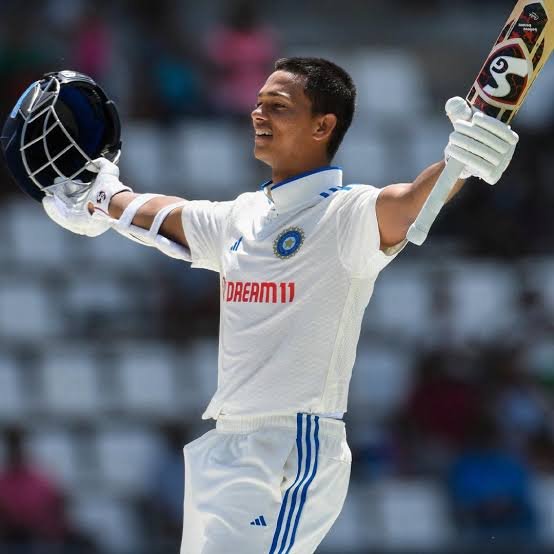
However, RoI’s inability to create durable relationships around Jaiswal proved to be their downfall. Despite Jaiswal’s heroics, wickets fell at regular intervals, preventing RoI from building significant momentum. Mumbai’s bowlers, headed by Tanush Kotian and Shams Mulani, followed their game plan with perfection, placing pressure on the batsmen and causing errors.
Kotian’s off-spin bowling was vital in suppressing RoI’s middle order. His precise lines and variations in velocity made it difficult for the batters to score easily. Mulani, on the other hand, exploited his left-arm spin successfully to trouble the right-handed batsmen, taking critical wickets at crucial periods. The combination of Kotian and Mulani ensured that RoI’s innings never really took off, despite Jaiswal’s best efforts.
Rest of India was eventually bowled out for 416, falling short of Mumbai’s total by 121 runs. This first-innings lead was the defining point of the match, as it gave Mumbai a considerable edge moving into the second innings.
Day 5: A Nail-Biting Finale
The last day of the contest was set up for a spectacular finale. Mumbai began the day with a lead of 274 runs, and their major purpose was to bat as long as possible to remove any prospect of a RoI victory. However, RoI’s off-spinner Saransh Jain had other intentions. Jain delivered a great spell of bowling, taking up two quick wickets in the early overs of Day 5, including the key wicket of Sarfaraz Khan.
Sarfaraz’s ejection, where he missed a twisting delivery on the backfoot from Jain, was a significant setback to Mumbai’s aspirations. Shardul Thakur followed suit, stepping out too early and being stumped by wicketkeeper Jurel off Jain’s bowling. These rapid hits dragged RoI back into the fight, as Mumbai’s advantage of 292 runs seemed susceptible.

At 171 for eight, Mumbai was in a perilous situation, and the match appeared to be heading for a thrilling climax. However, just like they had done in the previous innings, Tanush Kotian and Mohit Avasthi once again came to Mumbai’s rescue. Their record-breaking ninth-wicket partnership not only stabilized the innings but also guaranteed that Mumbai increased their lead beyond RoI’s reach.
Kotian’s century in the second innings was a credit to his temperament and skill. He showed tremendous maturity by moving out to negate the turn from RoI’s spinners and playing carefully against the part-timers. His ability to rotate the strike and pick holes in the field frustrated RoI’s bowlers, who were unable to remove him. Avasthi, however less aggressive, played an important role in supporting Kotian, blocking calmly and adding valuable runs to Mumbai’s total.
As the duo stretched Mumbai’s lead to 450 runs, the game progressively slipped away from RoI. Mumbai declared their innings at 329 for 8, and with short time remaining in the match, the captains agreed to shake hands, bringing the fight to an end. The match was technically ruled a draw, but Mumbai’s first-innings lead ensured that they were named champions of the Irani Cup.
The Key Performers: Tanush Kotian and Saransh Jain
The 2024 Irani Cup will be remembered for the great performances of two players—Tanush Kotian and Saransh Jain.
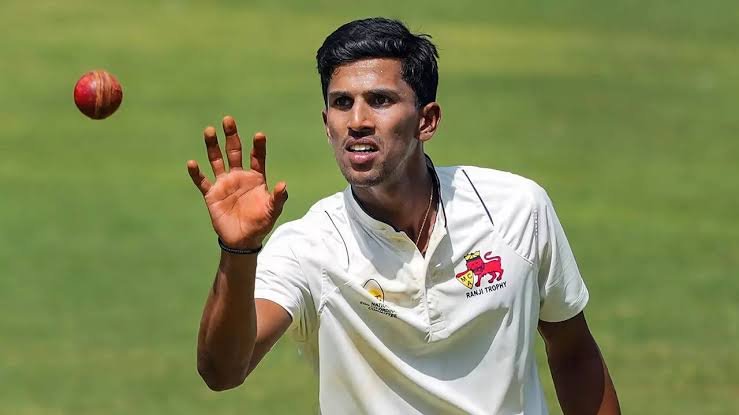
Tanush Kotian was certainly the star of the match. His all-round effort with both bat and ball was important in Mumbai’s triumph. Kotian’s twin hundreds in both innings demonstrated his versatility as a cricketer, while his off-spin bowling played a significant part in suppressing RoI’s middle order. His ability to execute under duress, notably in the second innings, when Mumbai was on the edge of collapse, showcased his mental tenacity and technical excellence.
Saransh Jain, on the other hand, was the standout performer for Rest of India. His six-wicket haul in Mumbai’s second innings kept RoI in the match and provided them a glimmer of hope on the final day. Jain’s ability to extract turn and bounce from the pitch plagued Mumbai’s batsmen, and his fast wickets on Day 5 threatened to change the direction of the match. Despite his efforts, Jain lacked help from the other bowlers, and RoI’s inability to capitalize
on his advances ultimately cost them the contest.
Significance of the Victory
For Mumbai, this triumph bears great significance. The team’s 27-year-long wait for the Irani Cup had been a source of discontent for players and fans alike. Winning the Irani cup in 2024 not only broke this long drought but also established Mumbai’s reputation as the dominant force in Indian domestic cricket.
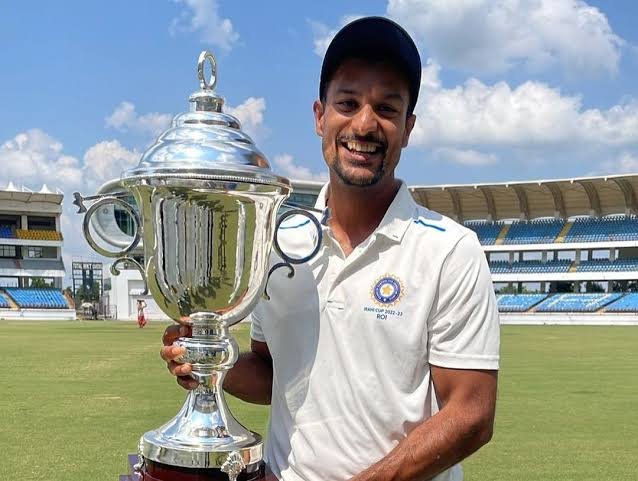
Ajinkya Rahane’s leadership was a major aspect in Mumbai’s triumph. Rahane, who has had a great international career, contributed his wealth of knowledge to the team. His calm demeanor and strategic ability were evident throughout the contest, notably in his decision-making during vital moments of the game. Rahane’s ability to encourage and guide the younger players, such as Tanush Kotian and Mohit Avasthi, was important in Mumbai’s success.
For Rest of India, the defeat was a tough pill to chew. Despite having some of the greatest players from throughout the country, RoI fell short in vital phases of the contest. Yashasvi Jaiswal’s stunning century and Saransh Jain’s bowling heroics were overshadowed by the team’s inability to develop partnerships and capitalize on opportunities.
Conclusion
Mumbai’s triumph in the 2024 Irani Cup is a credit to the team’s resilience, ability, and commitment. After 27 long years, the squad has finally recaptured the prized title, adding another chapter to their historic past in Indian domestic cricket. The match itself was a fascinating affair, with noteworthy performances from players like Tanush Kotian, Saransh Jain, and Yashasvi Jaiswal. As the dust settles on this historic win, Mumbai will want to build on this success and continue their supremacy in the domestic cricket circuit.

